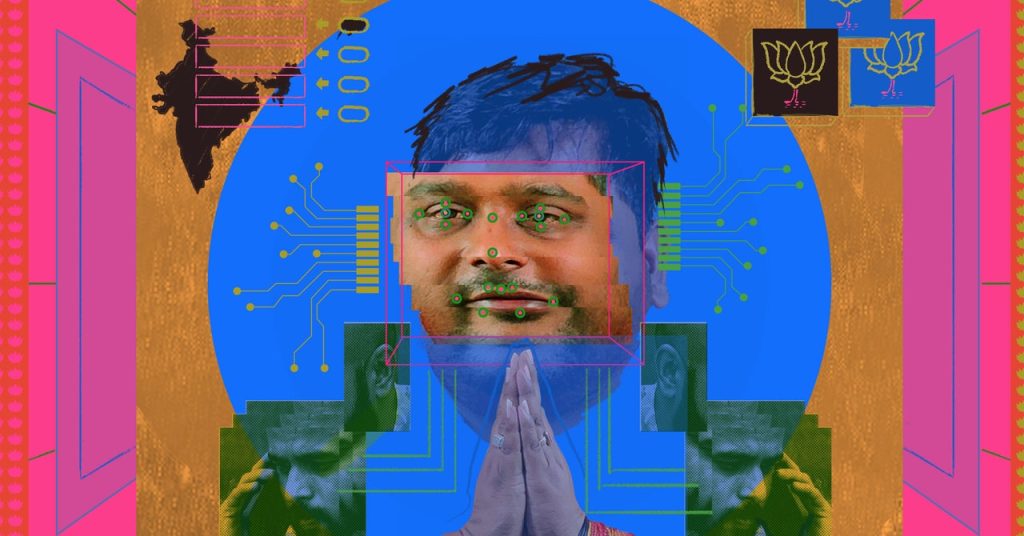The Rise of AI in Indian Politics
Introduction to AI in Elections
On a scorching April afternoon in Ajmer, Rajasthan, local politician Shakti Singh Rathore sat nervously in front of a greenscreen. It was his first experience being cloned digitally. Wearing a crisp white shirt and a ceremonial saffron scarf with the BJP logo, Rathore greeted his audience in Hindi. However, he was interrupted by Divyendra Singh Jadoun, the director of the shoot, who instructed him to minimize movement to ensure the AI could accurately capture his likeness.
The Role of Polymath Synthetic Media Solutions
At Polymath Synthetic Media Solutions, Divyendra Singh Jadoun collects video and audio data from local politicians to translate their speeches into various languages for voter outreach. Rathore’s speech, for instance, is generated in Hindi, Tamil, Sanskrit, and Marathi.
The Impact of Deepfakes in Indian Elections
India, the world’s largest democracy, is currently holding general elections with nearly a billion eligible voters. Deepfakes are playing a significant role, with political parties using AI to create audio fakes, propaganda images, and AI parodies. Unlike the global focus on misinformation, Indian politicians are leveraging this technology for voter outreach, navigating the country’s 22 official languages and numerous dialects to deliver personalized messages.
AI-Generated Campaigns
Jadoun is a key figure in this emerging industry. His company, Polymath Synthetic Media Solutions, has executed five AI campaigns this election season, earning $55,000. He charges significantly less than major political consultants, making digital avatars and audio clones for various politicians, including Prem Singh Tamang and Y. S. Rajasekhara Reddy. Jadoun has also created AI-generated propaganda songs for several politicians.
AI-Generated Campaign Songs
Jadoun also produces AI-generated campaign songs. One such song for local politician Ram Chandra Choudhary in Ajmer includes lyrics like: “For Ajmer, he brought a new gift / His name is Ram Chandra / He helps everyone / He was the president of Ajmer Dairy / He has always been impartial / He has Ram in his name / He is our pride / He’s a soldier of the Congress / Shares public anguish / Son of Ajmer / A guardian of development / Son of Ajmer / True form of development / Fight for everyone’s rights / Ram Chandra played the clarinet.”
The Convenience of AI for Politicians
Rathore, although not up for election this year, is one of over 18 million BJP volunteers working to ensure Prime Minister Narendra Modi’s government retains power. Traditionally, this would involve extensive travel and personal interactions with voters. However, with Jadoun’s deepfakes, Rathore’s job has become much easier. He spends a brief time talking to the camera, and Jadoun uses this data to generate personalized videos and calls for voters. These AI-generated messages address voters by name and discuss specific issues, often more effectively than Rathore himself could.
Jadoun’s Political Background
Jadoun is no stranger to politics. In 2015, he ran for election in Ajmer as district president of the National Students Union of India (NSUI), the youth wing of the Indian National Congress, which is now the main opposition to Modi’s BJP.
Conclusion
AI and deepfake technology are revolutionizing political campaigns in India, making voter outreach more efficient and personalized. As this technology continues to evolve, its impact on the democratic process will be significant and far-reaching.

3 Comments
Are deepfakes the future of Indian politics or just a dangerous gamble with truth?
Why are deepfakes being normalized in Indian politics?!
Looks like deepfakes are just another tool in the political arsenal now.